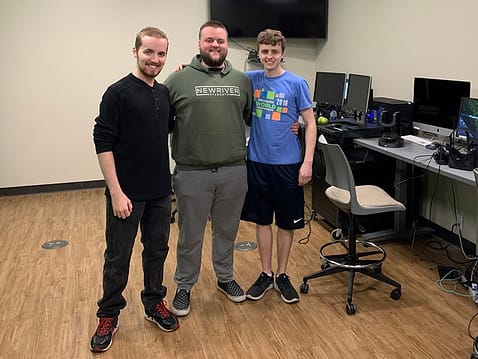
The lights just keep shining brighter on ACU’s School of Information Technology and Computing.
In November, a virtual reality game designed by a three-student team was accepted for distribution by Steam, which bills itself as “ the ultimate destination for playing, discussing and creating games.”
“They’ve boosted their resumes and portfolios by leaps and bounds,” said Rich Tanner (’10), clinical professor of digital entertainment technology.
That coveted achievement came on the heels of a major recognition in the spring 2019 by the Princeton Review. For the fourth year, Princeton Review named the ACU game design program to its list of the top 50 undergraduate programs in the United States, Canada and some countries abroad. In 2019, ACU’s program was named the best in Texas and 24th best internationally.
“The game design program at ACU is the highest-ranked program at a Christian university, which is bringing a lot of students to Abilene who wouldn’t have considered ACU previously,” said Dr. Brian Burton (’92), associate professor of digital entertainment technology,
In a small lab tucked in the corner of the third floor of Mabee Business Building, students don virtual reality headsets and tinker with designs to create new worlds of real-time CGI.
“This is really where art meets computer science,” Tanner said.
It’s where Andrew Thomas, Caleb Jackson and Bryce Gattis worked on their game, “Hold Your Ground,” that was accepted by Steam for distribution. The game went live Nov. 13. As of early December, players by the hundreds were donning virtual reality headsets and letting arrows fly from atop a castle, trying to knock off enemy creatures. Recently, the top score of the game to date was recorded by someone playing in Austria.
“Their game is getting played around the world,” Tanner said.
The students started working on their game design as part of a digital entertainment technology course last spring. By semester’s end, the game was far enough along to be played, but the students continued to tweak it over the summer and into fall before submitting it to Steam on Oct. 31. Projects, rather than tests, are the norm in DET courses. Creating a game with the potential to attract the attention of a major publisher shows the opportunities students in the ACU program are afforded.
The game published by Steam was the first of its magnitude for an ACU student, Tanner said, although student work has been accepted and published on smaller platforms such as those for smart phones and tablets – all of which played a role in ACU’s recognition by Princeton Review.
The team members, and other ACU students, are realizing the impact of an ACU education long before they graduate. Bryce, who graduated in December, got a job with Brazen Animation in Dallas last spring while still a student. He did some of his work long distance and also commuted. The company had representatives on campus in October 2018, and Bryce made an impression. He joined the staff as a technical director in January.
Caleb has landed an internship beginning in May 2020 with USAA insurance in Dallas. That company also had representatives on campus in fall 2018 and were impressed with what students in the digital entertainment technology classes were doing.
“That’s what got me the internship,” Caleb said.
The game the three teammates created is set in a medieval castle, with the enemy creatures trying to break in to steal treasures. An archer tries to knock them off before they reach the castle. The game is designed for one player, who gets points for accuracy, speed and number of creatures killed.
The VR headsets turned the entire lab into a castle, complete with stone walls and cobblestone walking surfaces. The virtual castle was created, Andrew explained, via computer programs including Adobe Photoshop and Blender Substance Designer, and was developed in the Unreal game engine.
Much of what the students do is fun, but that doesn’t mean it doesn’t involve a lot of work and study, too. And that work is paying off big time, with internships with major companies and jobs waiting on students when they graduate.
“They’re writing their own tickets,” Tanner said.
